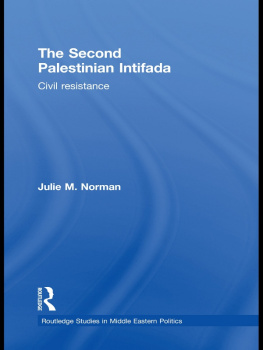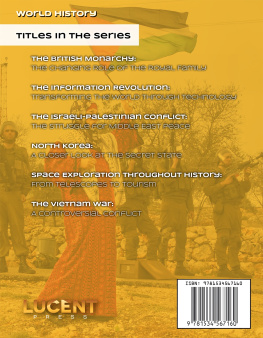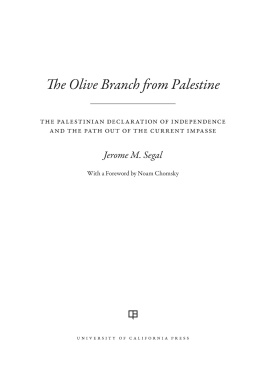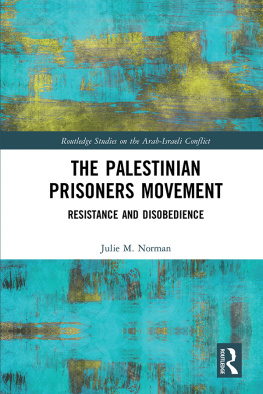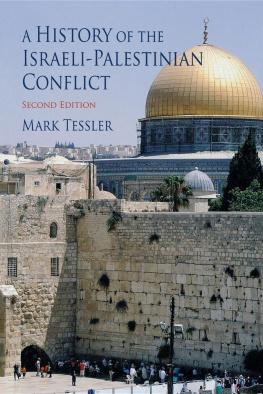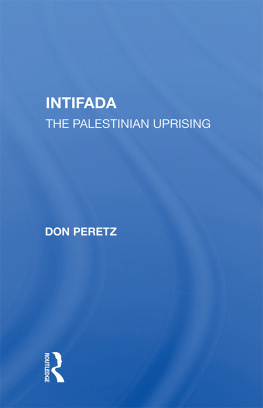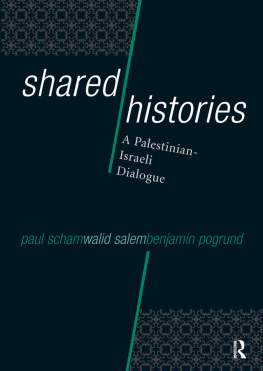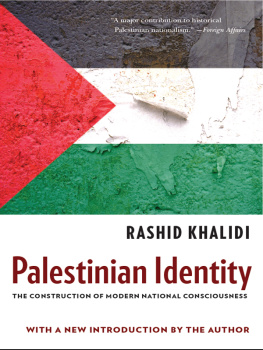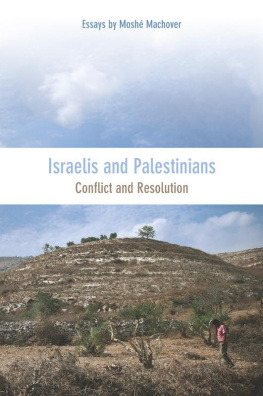Echoes of the Intifada
First published 1991 by Westview Press
Published 2018 by Routledge
52 Vanderbilt Avenue, New York, NY 10017
2 Park Square, Milton Park, Abingdon, Oxon OX14 4RN
Routledge is an imprint of the Taylor & Francis Group, an informa business
Copyright 1991 by Taylor & Francis
All rights reserved. No part of this book may be reprinted or reproduced or utilised in any form or by any electronic, mechanical, or other means, now known or hereafter invented, including photocopying and recording, or in any information storage or retrieval system, without permission in writing from the publishers.
Notice:
Product or corporate names may be trademarks or registered trademarks, and are used only for identification and explanation without intent to infringe.
Library of Congress Cataloging-in-Publication Data
Echoes of the Intifada : regional repercussions of the Palestinian
-Israeli conflict / edited by Rex Brynen.
p. cm. (Westview special studies on the Middle East)
Includes bibliographical references and index.
ISBN 0-8133-8171-1
1. West BankHistoryPalestinian Uprising, 1987Influence.
2. Gaza StripHistoryPalestinian Uprising, 1987Influence.
3. Middle EastPolitics and government1979 . I. Brynen, Rex.
II. Series.
DSll0.W47E24 1991
956.94054dc20
90-22513
CIP
ISBN 13: 978-0-367-01660-9 (hbk)
Contents
Rex Brynen and Neil Caplan
, Salim Tamari
, Raja Shehadeh
, Mark Tessler
, Nadim Rouhana
, Paul Noble
, Lamis Andoni
, Bahgat Korany
, Fred Lawson
, Tamar Weinstein (with Adam Jones)
, Fred Khouri
Guide
Important historical turning points often seem to be unpredicted until they are upon us. For most observers (this writer included) the Palestinian uprising that erupted in December 1987 was unexpectednot because the depth of Palestinian national aspirations or the growing strength of Palestinian socio-political organization under occupation were unclear, but rather because it seemed unlikely that resistance to Israeli occupation could so quickly escalate and that once set in motion could be sustained in such an intense and continuing manner.
Yet the intifada has continued through a second and a third year. The West Bank and Gaza Strip have seen protest, violence and repression; Israeli politics has been beset by both turmoil and paralysis; the diplomatic arena has experienced bouts of rapid political change beset by periods of apparent blockage and inertia. The Palestine Liberation Organization has declared the formation of an independent Palestinian stateyet that goal still remains elusive. And amid all this it remains an inescapable conclusion that the intifada has had a major, even fundamental, effect on the continuing conflict in the Middle East.
This volume represents an attempt to understand the repercussions of the Palestinian uprising and its implications for the future of Palestinian-Israeli and Arab-Israeli conflict. The book would not have been possible without the support of many people. Philip Mattar and Bill Young offered early encouragement and useful comments on the project. Alex Brynen, as usual, provided myriad forms of assistance. My research assistant, Adam Jones, also helped extensively with the volume. The contributors, of course, deserve my thanks both for their contributions and their suggestions along the way. Neil Caplan deserves special thanks, having not only collaborated in writing the various section introductions, but having also brought to our joint endeavors a mind sharp for historical meaning and constructive criticism. Barbara Ellington at Westview Press was as supportive and efficient as ever. Finally, I am grateful to the Social Science and Humanities Research Council of Canada for their financial support; and I am equally grateful to the Inter-university Consortium for Arab Studies (Montral) and colleagues and students in the Department of Political Science at McGill University for providing an environment I have always found both productive and stimulating.
Rex Brynen
Montral, Qubec
Introduction
The Palestinian Uprising
Rex Brynen and Neil Caplan
On 5 June 1967 war once more erupted in the Middle East. Within a matter of days, the West Bank and Gaza Strip (controlled by Jordan and Egypt respectively since 1948) were occupied by Israel. Two decades later, in the summer of 1987, that occupation seemed as firmly entrenched as ever.
In the territories themselves, the status quo of twenty years seemed to have achieved a striking air of permanence. In addition to the constant presence of the Israeli Defense Forces, some 67,500 settlers now made their homes in more than one hundred and thirty settlements in what many Israelis had come to regard as Judea, Samaria, and Gaza District. To this end, over one-half of the land of the West Bank and almost one-third of that in the Gaza Strip had been appropriated by the Israeli authorities. Although divided on many issues of foreign policy, both main partners in Israels national unity coalition government continued to oppose the principle of Palestinian self-determination. Prime Minister Yitzhak Shamir and the Likud Party emphasized Israels historical claims to the territories, and hence rejected the principle of land for peace which seemed to flow from Israels previous acceptance of UN Security Council Resolution 242 after the 1967 war. The Labor Party headed by Shimon Peres clung to hopes of a Jordanian option whereby the territories would pass under an Israeli-Hashemite condominium. Neither party seemed interested in taking political initiatives or risks over the future of the territories.
For the more than 1.7 million Palestinians in the West Bank and Gaza Strip, nothing in either Israeli position offered anything beyond the continued realities of occupation.
As 1987 came to a close, regional developments offered little hope of change. In the Arab world the salience of the Palestine issue seemed in slow but steady decline. Political coordination between the Palestine Liberation Organization and Jordan had broken down in 1986. The PLO itself, tom by bitter internal conflict since 1983, had only recently reestablished its own tenuous political unity in April 1987. It remained under attack in Lebanon, and embroiled in political disputes with both Jordan and Syria. Equally unpropitious was the November 1987 Arab League summit meeting in Amman, called to discuss the Iran-Iraq war. Quite apart from the offhanded treatment accorded members of the PLO delegation by their Jordanian hosts, most Palestinians were struck by the way the assembled Arab leaders appeared to relegate the Palestinian cause to a secondary status.
Finally, the Palestine question seemed in a state of increasing neglect at the international level too. Neither the Camp David accords of 1978 nor the short-lived initiative announced by US President Ronald Reagan in September 1982 had made significant progress towards meeting Palestinian national aspirations. On the contrary, both envisaged little more than limited Palestinian autonomy under Israeli or Jordanian sovereignty, with the Reagan plan explicitly rejecting the establishment of a Palestinian state. A peace process thus existed in name only; the Reagan administration continued to oppose direct discussions with the PLO, focussing instead sporadic diplomatic energies at Jordan. The Palestinian question also seemed absent from the agenda of improving East-West relations, a perception reinforced by the scant attention given to the issue by Reagan and Soviet leader Mikhail Gorbachev at their December 1987 summit.


